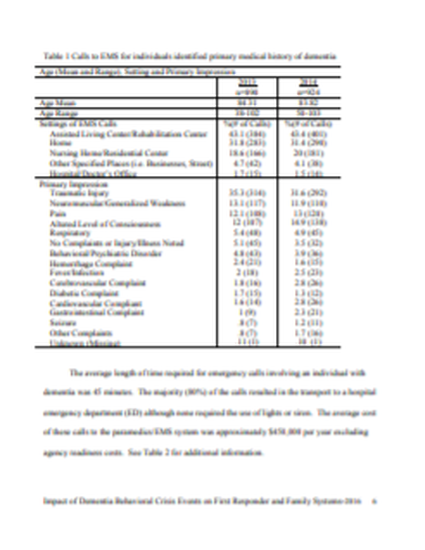
Enhancing quality of life for people with dementia is identified in Healthy People 2020 as a public health priority. In Idaho, the proportion of individuals diagnosed with Alzheimer’s disease and related dementias (ADRD) is projected to increase by 81 % - 127 % between 2000 and 2025. Policies designed to address needs of this population must be based on an understanding of system wide impacts of disease. The purpose of this exploratory study was to examine the impact of behavioral crises related to dementia on first responders. For the purpose of this study, “first responders” were defined as individuals employed by the Idaho Department of Health and Welfare Mobile Crisis Unit in Regions 1, 3, and 4, Ada County Paramedics/EMS, and social workers employed in health care settings in the Treasure Valley. A mixed methods design was used with information gathered from incident reports from the Ada County Paramedics and focus groups and interviews with key informants.
Ada County Paramedics/EMS receives approximately 22,000 calls annually with 924 of calls related to behavioral crisis involving individuals with ADRD. Most calls were from assisted living facilities (n=401), home (n=290), or skilled nursing facilities (n=181). The majority (80%) of calls resulted in transport to a hospital emergency department (ED); none of the calls required use of lights or siren. Annual costs of calls to EMS and ED were estimated to be $457,380 and $905,020, respectively.
Themes from key informants included: an increase in number and complexity of calls; lack of appropriate protocols within systems to support individual in crisis or their family or caregiver; and need for training on progression of ADRD and de-escalation strategies.
This document was originally published by Boise State University. Copyright restrictions may apply.
Available at: http://works.bepress.com/sarah_toevs/15/
